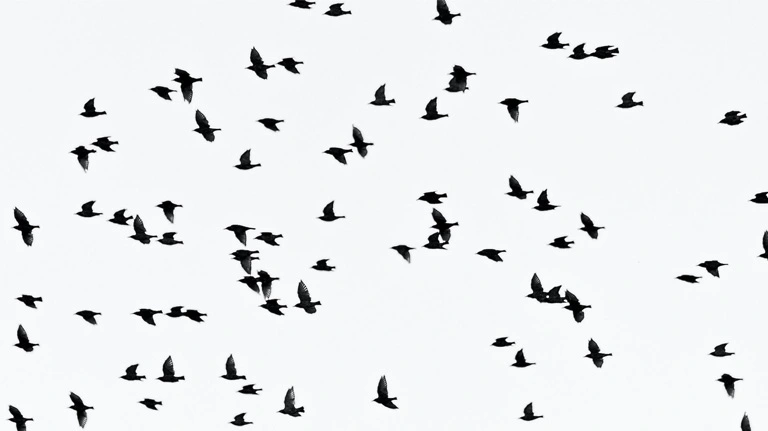
The Birds: 1963
An essay about the unknown.
I wasn’t familiar with it, but I was intrigued by how there was a genealogy sitting behind the existence of a movie; not something I’d really given much thought to before now; the transgenerational effect of film production. I was curious. I wanted to understand what Aster had drawn from ‘The Birds’ that had, in some way contributed to his filmmaking, and specifically ‘Beau is Afraid’.
I liked the way in which the first film (Beau is Afraid), had led me to a second film (The Birds), and was creating a new and unfolding path in front of me; something different for me to explore. I wondered where I’d find myself next.
As The Birds film ended, I involuntarily shouted “What!!” at the television.
“Ahh, okay that’s the similarity. Another film that leaves you with plenty to question; a sea of infinite wonderings.” Hitchcock’s presence in Aster’s film suddenly became abundantly clear.
For context, The Birds is a film about …
… well hang on, because I could tell you it’s about how all of the birds in the remote town of Bodega Bay turn on the people who live there; making it a film about the fragility of human existence.
Or, I could tell you it’s a film about control, power, and dominance.
Or, I could tell you it’s a film about paranoia.
Or, I could tell you it’s a film about lies and manipulation.
Or, I could tell you it’s a film about sex, fantasy, and desire.
Or, I could tell you it’s a film about grief, fear, and loneliness.
Or, I could tell you it’s a film about being rescued.
The simple fact is that it’s a film about a lot of different things.
I was conscious that I didn’t want to overly search online for answers, because as a sixty-year-old movie, there would be an abundance of interpretations and discussions trying to cleverly tell you what’s what. I expect Hitchcock and his films have been studied to death over the years. In fact, I wouldn’t be surprised if you could take a course in ‘the life and works of’. I don’t want to pull up a seat at the table and claim to be an expert, I’m not. I decided instead, that I’d rather draw upon things that I personally extracted from the film.
The most compelling observation was the receipt of curiosity.
As a viewer of the film, you’re asking why throughout the entire film…
Why did Mitchell manipulate Melanie in the opening scene at the pet shop?
Why did Melanie pretend to be someone she isn’t?
Why did Melanie go to such great lengths to track down Mitchell?
Why did Melanie feel compelled to show Mitchell that she was capable of finding him?
Why wasn’t Mitchell angry that Melanie had let herself into his home uninvited?
Why didn’t Annie and Mitchell survive as a couple?
Why was Annie helping Melanie pursue Mitchell when she was clearly still in love with him?
Why was Lydia so wary of Melanie, or any other woman for that matter, whom Mitchell took a fancy to?
Why was Cathy so immediately accepting of Melanie?
Why was there such a huge age gap between Mitchell and Cathy?
Why was Melanie so defensive about Rome?
Why did Melanie’s mother leave?
Why were the birds attacking people?
Why had nature malfunctioned?
Why were the birds seemingly working together to cause chaos?
Why did birds enter Lydia’s home?
Why did Melanie want to stay that night?
Why are some people so calm, in the face of so much absurdity?
Why did birds enter Dan’s home?
Why did birds murder Dan?
Why did Melanie insert herself so presumptuously into Mitchell’s life?
Why did Melanie and Mitchell’s intimate and sexual relationship escalate so incredibly quickly?
Why did Lydia send Cathy to school, if she was aware of the danger?
Why did Annie and Melanie evacuate the children when it was inevitable they’d be hurt?
Why did Melanie really call her father?
Why were some people in absolute denial of the facts?
Why, in the 1960’s did some people think that humans were ruining the world?
Why did some people choose to stay in town?
The relentless string of ‘why’ questions, that ooze from the film scene by scene, create a mounting tension within the viewer.
‘At what point am I going to start getting answers?’ you wonder as you watch.
I think Hitchcock cleverly inserts the neurotic woman’s outburst in the deserted restaurant, at this very moment, to help diffuse the tension within everyone; the characters and the audience. Affirming that he knows how much he’s wound people up.
He affords us the luxury of the projective scream.
“Why is this happening?
“This all started when you arrived?
“I think you are evil.”
The woman yells at Melanie (on behalf of all of us).
…What does Hitchcock do next?
He smacks you in the face.
How dare you ask such questions!
How outrageous that you could allow yourself to become so preoccupied with meaning when he wants you to remain in the unknown of the film.
Melanie slaps the neurotic woman around the face, with quite some force.
Hitchcock puts you in your place.
Don’t challenge me: just be in the film.
And here,
have some more.
Why would the birds gather?
Why would they gather together?
Why would the birds attack?
Why did birds appear to be satisfied at the sight of the pain that they were inflicting?
Why did the birds randomly, and periodically stop attacking?
Why didn’t anyone think to remove or release the lovebirds?
Why did Melanie walk towards the noise of birds, knowing the risk of being attacked?
Why did Mitchell step outside the house, knowing he could die?
Why did anyone think it was safe to take the lovebirds in the car?
Why did Mitchell choose to drive through hundreds of predatory birds, in a car with a material roof?
Why did Hitchcock choose the ending he finished the film with?
Why?
Because it left you in a state of questioning.
It left his work, his creation, alive in your mind.
He penetrated your head like the birds penetrated the town.
He baffled you like the townspeople were baffled.
He then remained in your thoughts, just as the birds had remained in town.
Hitchcock, rent-free in your head, the birds rent-free in Bodega Bay.
Then, when enough time has passed, your thoughts would begin to dissipate, just as the birds began to migrate.
Psychologically,
disturbingly,
clever.
And, that’s without me unpacking a single theme of the story.


